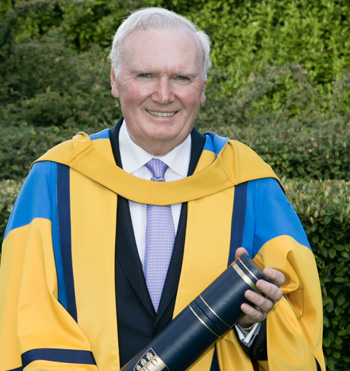Dermot Gallagher
UNIVERSITY COLLEGE DUBLIN
HONORARY CONFERRING
Tuesday, 1 September 2015 at 5.30 p.m.
TEXT OF THE INTRODUCTORY ADDRESS DELIVERED BY PROFESSOR RONAN FANNING on 1 September 2015, on the occasion of the conferring of the Degree of Doctor of Laws, honoris causa on DERMOT GALLAGHER
President, Honoured Guests, Ladies and Gentlemen,
 It gives me great pleasure to stand before you this evening to introduce Dermot Gallagher partly because of our personal friendship but also because we were both pupils of Professor Desmond Williams in the history department of this university in the 1960s.
It gives me great pleasure to stand before you this evening to introduce Dermot Gallagher partly because of our personal friendship but also because we were both pupils of Professor Desmond Williams in the history department of this university in the 1960s.
Desmond Williams was my mentor, a man to whom I owe an incalculable intellectual debt, and my predecessor as UCD’s Professor of Modern History. He also pioneered the study of Irish diplomatic history the archival sources for which were then non-existent. So his courses spanned the history of international relations in Europe and beyond.
Those lectures sparked the passion for diplomacy that informed Dermot Gallagher’s career and prompted him to join what was then the Department of External Affairs in 1969, the year violence erupted in Northern Ireland. Chance decreed that he was the weekend duty officer in Iveagh House that August when a group of nationalist MPs arrived demanding arms for Belfast’s Catholics and seeking a meeting with the Taoiseach, Jack Lynch.
Dermot Gallagher’s first postings abroad – in San Francisco and with the United Nations in New York – were followed by his return to the epicentre of Northern Ireland policy when he became press officer in the Irish Embassy in London in 1973, the role in which he attended the negotiation of the ill-fated Sunningdale agreement.
His appointment as Michael O’Kennedy’s deputy chef de cabinét with the European Commission in Brussels signaled the growing recognition of his talents and it was followed in 1985 by his first ambassadorial appointment, to Nigeria.
Although the 1980s saw an intensification of the party political divide, Dermot Anthony Gallagher – universally known as DAG in Iveagh House – avoided the politicisation that befell some of his colleagues. Garret FitzGerald recalled how in March 1987 he suggested to Charles Haughey who was about to succeed him as Taoiseach that he appoint Dermot Gallagher as Head of the Anglo-Irish Division; and he did. Although Haughey when in opposition had bitterly denounced the seminal Anglo-Irish agreement of 1985, he now told Gallagher he wanted the agreement implemented ‘fully and imaginatively’.
Dermot Gallagher next played a key role as Ireland’s Ambassador in Washington from 1991. He had already become friendly with Bill Clinton before he became President in 1993 and his ambassadorial lobbying of the White House and of Congress resulted in the modification of legislation to limit tax concessions to US firms abroad that could have damaged the Irish economy. He also ensured the US government’s unwavering support for the peace process after the IRA ceasefire of 1994; this was most dramatically demonstrated by President Clinton’s granting a visa to Gerry Adams.
On his return from Washington in 1997 he became Second Secretary General, again as the head of the Anglo-Irish Division and he led the team of officials at the Stormont negotiations that culminated in the Good Friday Agreement of 1998. The best advisors, wrote Tony Blair, ‘recognise the need for being creative and occasionally bold’ and Dermot Gallagher did that ‘with great charm and good humour’. His ‘speed, imagination and mental agility’, wrote Jonathan Powell, Blair’s advisor, ‘were an essential part of the joint British Irish effort to reach an agreement.’
But the most telling praise came from a Unionist, Lord Ken Maginnis, with whom he had become the best of friends and who wrote how their ‘friendship developed on the basis of having, whatever the route, the same objective: to achieve active peace and cooperation … and creating something people want and can understand.’ I like to think that Dermot Gallagher might well have reminded his negotiating team of Talleyrand’s final instruction to his own negotiators on the eve of the Congress of Vienna of which Desmond Williams told his students: ‘And above all, gentlemen, no zeal.’
After the success of the Good Friday Agreement, Dermot Gallagher moved briefly to the Department of the Taoiseach as Secretary General before returning as Secretary General of the Department of Foreign Affairs in 2001-2009, the appointment which crowned his career.
He then accepted an invitation to chair UCD’s Governing Authority and those of us who served with him on that body from 2009 until 2013 saw at first hand his incomparable skill at chairing the most fractious of meetings. Less well known was his incessant work behind the scenes in the corridors of power to advance and protect the best interests of this university. For those services alone Dermot Gallagher richly deserves the honour that his alma mater bestows upon him today.
_____________________________________________________________________
Praehonorabilis Praeses, totaque Universitas,
Praesento vobis hunc meum filium, quem scio tam moribus quam doctrina habilem et idoneum esse qui admittatur, honoris causa, ad Gradum Doctoratus in utroque Jure, tam Civili quam Canonico; idque tibi fide mea testor ac spondeo, totique Academiae.